| | | OFFLINE | | Post: 18.987
Post: 1.633 | Registrato il: 28/08/2005
Registrato il: 20/01/2009 | Administratore | Utente Veteran | |
|
 GENERAL AUDIENCE TODAY
GENERAL AUDIENCE TODAY
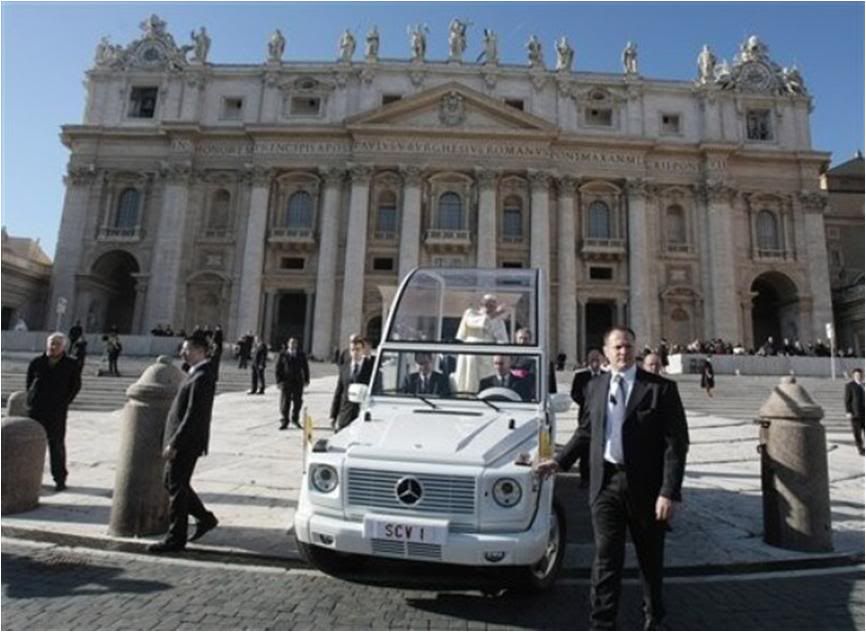
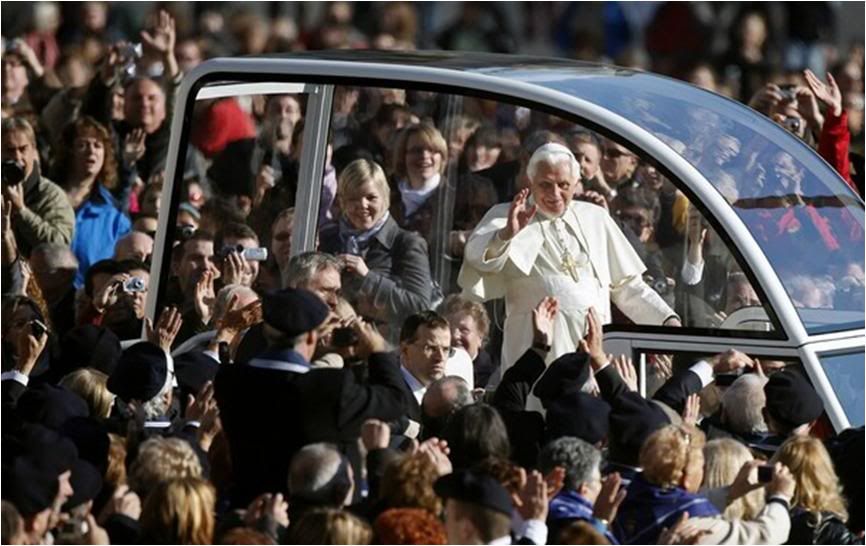
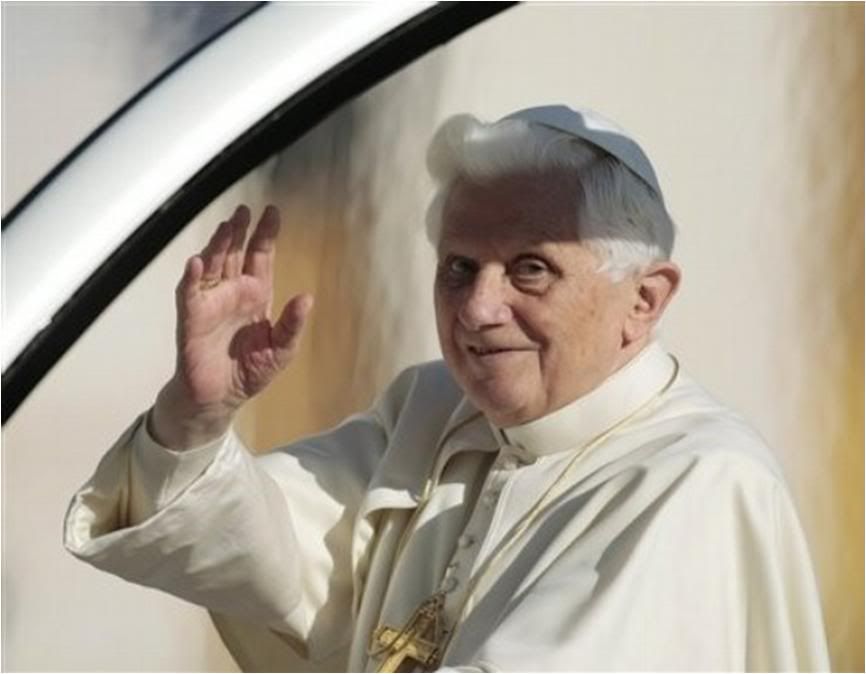
The Holy Father's catechesis today was on Guillaume (William) of St. Thierry, a 12th century monk and theologian.
The audience was held in St. Peter's Square instead of Aula Paolo Vi where it is usually held in fall and winter, because there were too many pilgrims present. [Aula Paolo VI can only accommodate 9,000 at the most.]
Here is how the Pope synthesized his catechesis in English:
In our catechesis on the Christian culture of the Middle Ages, we now turn to William of Saint-Thierry, an outstanding monastic theologian and a close friend of Saint Bernard of Clairvaux.
William took active part in the twelfth-century movement of monastic renewal and, after serving as abbot of Saint-Thierry, he entered the Cistercian monastery of Signy.
A central theme of his writings is the nature and power of love, seen as the ultimate vocation and the driving force of the human spirit. For William, this innate human drive finds perfection in the love of the triune God, the source and goal of all love.
As the culmination of a process of purification and integration of the affections, the love of God brings supreme human fulfilment, and a profound experiential knowledge of both God and the world about us. In William’s celebrated phrase, Amor ipse intellectus est – love itself brings knowledge.
By contemplation of the mysteries of the faith, we grow in the image of God and, by uniting our will to his, we become one with him.
May the example and teaching of William of Saint-Thierry strengthen our desire to love God above all things and to let that love overflow in love of our neighbour. May we thus discover authentic joy and the foretaste of eternal bliss.
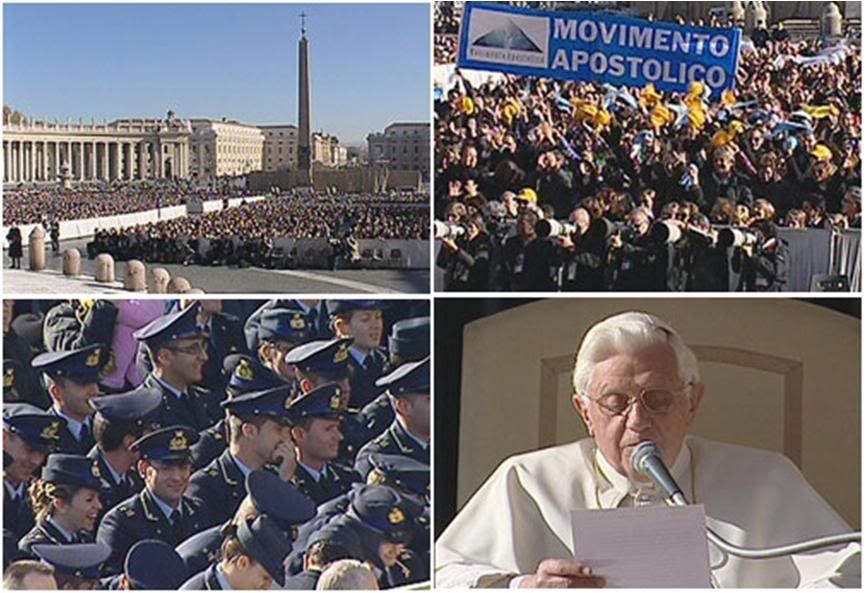 Here is a translation of today's catechesis:
Here is a translation of today's catechesis:
Dear brothers and sisters,
In a previous catechesis, I presented the figure of Bernard of Clairvaux, 'Doctor of Tenderness', and a great protagonist of the 12th century.
His biographer - a friend and admirer - was Guillaume (William) de Saint-Thierry, to whom I will devote my reflection today.
William was born in Liege (Belgium) some time between 1075 and 1080 to a noble family. Gifted with lively intelligence and an innate love for study, he attended famous schools of the time, like those in his hometown and in Rheims, France.
He came into personal contact with Abelard, the teacher who first applied philosophy to theology in such an original way that he provoked much perplexity and opposition. Even William expressed his own reservations, and called on his friend Bernard to take a position against Abelard.
Responding to God's mysterious irresistible call to the consecrated life, William entered the Benedictine monastery of Saint-Nicaise in Reims in 1113, and several years later, became the abbot of the monastery of St-Thierry, in the diocese of Rheims.
At that time, the demand was widespread to purify and renew monastic life in order to make it authentically evangelical. William worked for this in his own monastery as well as within the Benedictine order, in general.
However, he met with not inconsiderable resistance to his attempts at reform, and therefore, despite the opposing counsel of his friend Bernard, he left the Benedictine abbey in 1138, exchanged his black robes for the white robes, to join the Cistercians in Signy.
From that time until his death in 1148, he dedicated himself to the prayerful contemplation of the mysteries of God, which had always been his most profound desire, and to composing works of spiritual literature that are important in the history of monastic theology.
One of his first works is entitled De natura et dignitate amoris (The nature and dignity of love)), which expresses William's fundamental ideas that are valid even for us today.
The principal energy that motivates the human spirit, he says, is love. Human nature, in its most profound essence, consists in loving. Only one task is entrusted to every human being: to learn to love, sincerely, authentically, freely. But this task can only be absolved in the school of God, where man can reach the goal for which he was created.
William writes: "The art of arts is the art of love... Love is inspired by the Creator of nature. Love is a spiritual force which leads the spirit as by natural gravitation to the place and goal to which it belongs" (La natura e la dignità dell’amore 1, PL 184,379).
Learning to love requires a long demanding journey, which William articulates in four stages corresponding to the ages of man: infancy, youth, maturity and old age.
In this itinerary, the person must impose upon himself an effective asceticism, strong self-control to eliminate any disordered affection and any surrender to selfishness, thus uniting one's life to God - the spring, the goal and the power of love - until one reaches the peak of spiritual life that William defines as 'wisdom'.
At the end of this ascetic itinerary, there is great serenity and sweetness. All the faculties of man - intelligence, will, affections - then rest in God, whom we know and love in Christ.
Even in other works, William speaks of this radical calling to love of God, which constitutes the secret of a successful and happy life, and which he describes as an incessant and growing desire, inspired by God himself in the heart of man.
In a meditation, he says that the object of this love is Love with a capital 'L', namely God. It is God who pours himself into the heart of he who loves, and makes the heart capable of receiving God.
"God gives himself to satiety but in such a way that even so, the desire for God never grows less. This impetus to love is the fulfillment of man" (De contemplando Deo 6, passim, SC 61bis, pp. 79-83).
It is striking that William, in speaking of the love of God, attributes a remarkable importance to the affective dimension. Basically, dear friends, our heart is made of flesh, and when we love God, who is Love himself, how can we not express in this relation with the Lord even our most human sentiments, like tenderness, sensitivity, delicacy? The Lord himself, becoming man, wanted to love us with a heart of flesh.
According to William, love has another important property: it enlightens the intelligence and allows us to know God better and in a profound way; and in God, to know persons and events.
The knowledge that comes from the senses and the intelligence reduces but does not eliminate the distance between subject and object, between the 'I' and the 'you'.
Instead, love produces attraction and communion, to the point where there is a transformation and assimilation between the subject who loves and the beloved object.
This reciprocity of affection and sympathy allows a more profound knowledge than that which results only from reason. Thus, the famous statement by William: "Amor ipse intellectus est" - Love in itself is knowledge.
Dear friends, let us ask ourselves: Is our life not like that? Is it not true that we really know only those that we love? Without a certain sympathy, one cannot know anyone nor anything! This goes above all for the knowledge of God and his mysteries which surpass the capacity of comprehension by our intelligence: We know God if we love God!
A synthesis of the thinking of William of St-Thierry is contained in a long letter to the Carthusians of Mont-Dieu, whom he visited and wished to encourage and comfort.
The learned Benedictine Jean Mabillon in 1690 gave this letter a significant title: Epistola aurea (Golden letter). Indeed, the teachings on spiritual life it contains are precious for all who wish to grow in communion with God, in holiness.
In this treatise, William proposes an itinerary in three stages. He says it is necessary to pass from the 'animal' man to the 'rational' man, in order to get to the 'spiritual' man.
What did our writer mean with these three terms? In the beginning, a person accepts the view of life inspired by the faith, through an act of obedience and trust. Then, through a process of internalization, in which reason and will play a great role, faith in Christ is accepted with profound conviction, and one experiences a harmonious correspondence between what one believes and hopes, and the most secret aspirations of the spirit, our reason, our affections.
Thus, one reaches the perfection of spiritual life when the realities of the faith are sources of intimate joy and of truly satisfying communion with God. Then one lives only in love and for love.
William based this itinerary on a solid view of man, inspired by the ancient Greek fathers, especially Origen, who, with daring language, had taught that the vocation of man was to become like God who created him in his image and likeness.
The image of God present in man urges him towards likeness, that is, towards an increasingly fuller identification between one's will and the divine will. One does not achieve this perfection, which William calls 'unity of spirit', with personal effort, no matter how sincere and generous, because something else is necessary.
This perfection is reached through the action of the Holy Spirit, who takes up his dwelling in the soul and purifies, absorbs and transforms in love every impulse and desire of love that is present in man.
"You then become another likeness of God", we read in the Epistola aurea, "that is no longer called a likeness, but unity of spirit - when man becomes one with God, one spirit, not merely because of unity in an identical will, but in not wishing to be anything else. Man thus deserves to become not God, but what God is - man becomes by grace what God is by nature" (Epistola aurea 262-263, SC 223, pp. 353-355).
Dear brothers and sisters, this author, whom we may describe as the "singer of love and of charity" teaches us to make the basic choice in our life, that which gives sense and value to all our other choices: to love God, and through his love, to love our neighbor. Only thus can we encounter true joy, a token of eternal beatitude.
Let us therefore place ourselves in teh school of saints to learn how to love in an authentic and total way, to enter this itinerary of existence.
With a young saint and Doctor of the Church, St. Therese of the Child Jesus, let us tell the Lord that we wish to live for love and of love.
I will conclude with a prayer from this saint: "I love you, and you know it, divine Jesus! The Spirit of love burns me with its fire. Loving you, I draw near to the Father, whom my weak heart keeps, without fleeing. O Trinity! You are a prisoner of my love. To live for love, here below, is an endless giving, without asking for recompense... When one loves, one makes no calculations. I have given everything to the Divine Heart which overflows with kindness. And I proceed lightly - I have nothing left, and my only wealth is to live from love".
In his greeting to Italian-speaking pilgrims towards the end of the GA, the Pope had these special words:
Today is the 25th anniversary of the promulgation of John Paul II's Apostolic Exhortation Reconciliatio et paenitentia, which called attention to the importance of the Sacrament of Penitence in the life of the Church.
On this significant occasion, I wish to re-evoke some extraordinary figures who were 'Apostles of the Confessional", tireless dispensers of divine mercy: St. Jean Marie Vianney, St. Giuseppe Cafasso, St. Leopoldo Mandic, St. Pio of Pietrelcina.
May their testimony of faith and charity encourage you, dear young people, to flee from sin and to plan your future as a generous service to God and to your neighbor.
May they help you, dear people with ailments, to experience the mercy of the Crucified Christ in your suffering.
And may they inspire you, dear newlyweds, to create a family in an atmosphere of constant faith and reciprocal understanding.
Finally, may the example of these saints, assiduous and faithful ministers of divine forgiveness, be for priests - especially in this year for Priests - and for all Christians an invitation to trust always in the goodness of God, in availing and celebrating trustfully the Sacrament of Reconciliation.
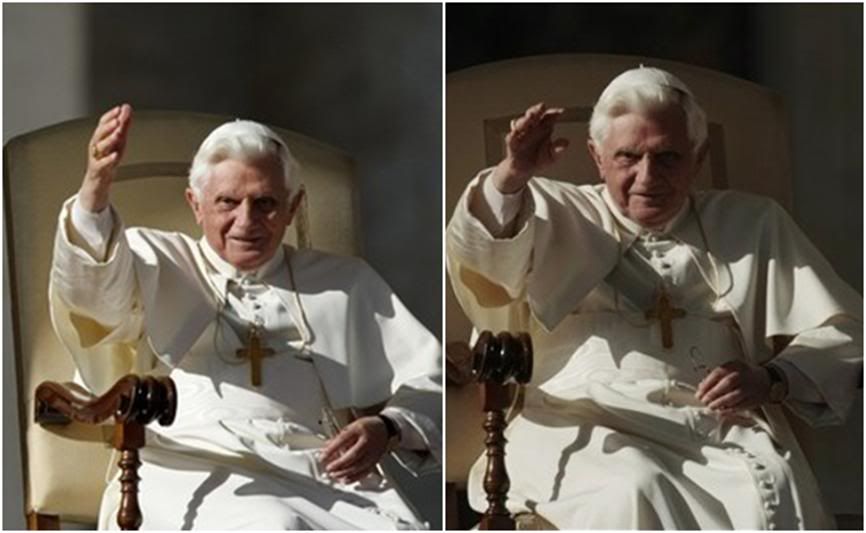 In the top left photo on this panel, the Pope is greeting former Italian Senate President Marcello Pera, with Lateran University rector Mons. Rino Fisichella, both participants in the Lateran's international congress on science, theology and philosophy. No information so far on the center row photos.
In the top left photo on this panel, the Pope is greeting former Italian Senate President Marcello Pera, with Lateran University rector Mons. Rino Fisichella, both participants in the Lateran's international congress on science, theology and philosophy. No information so far on the center row photos.
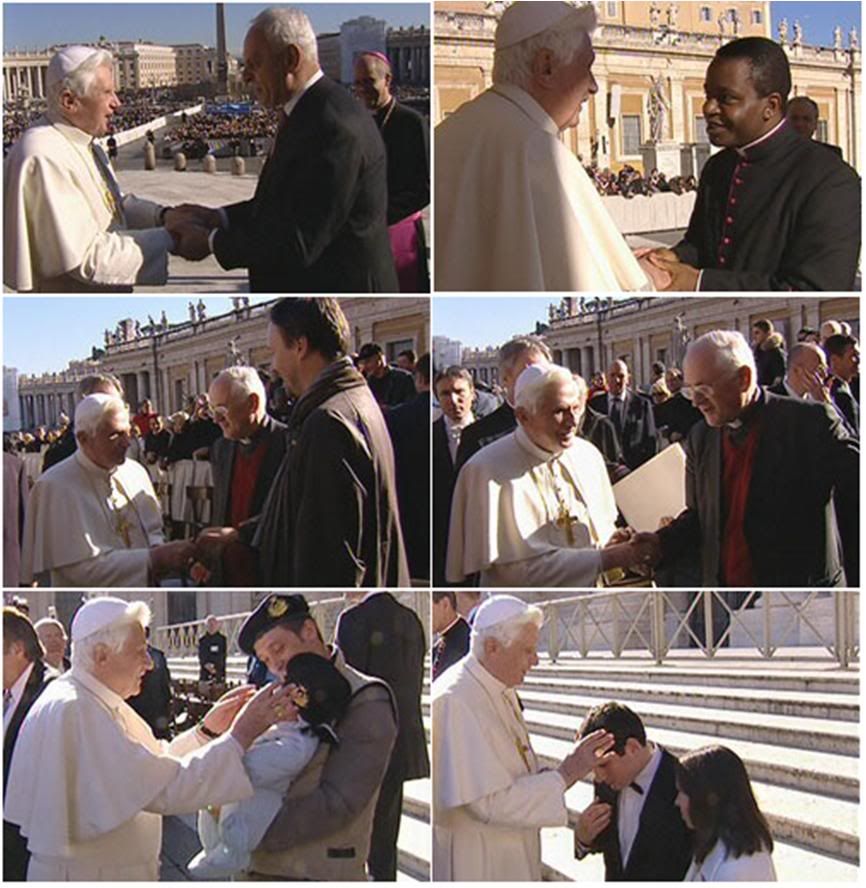 NB: This morning, the Vatican Press Office posted the text of the Pope homily at the Mass with the theologians yesterday.
NB: This morning, the Vatican Press Office posted the text of the Pope homily at the Mass with the theologians yesterday.
Another one of his precious unscripted homilies.
I have placed the translation in the post about the Mass on the preceding page.
[Modificato da TERESA BENEDETTA 04/12/2009 02:55] |